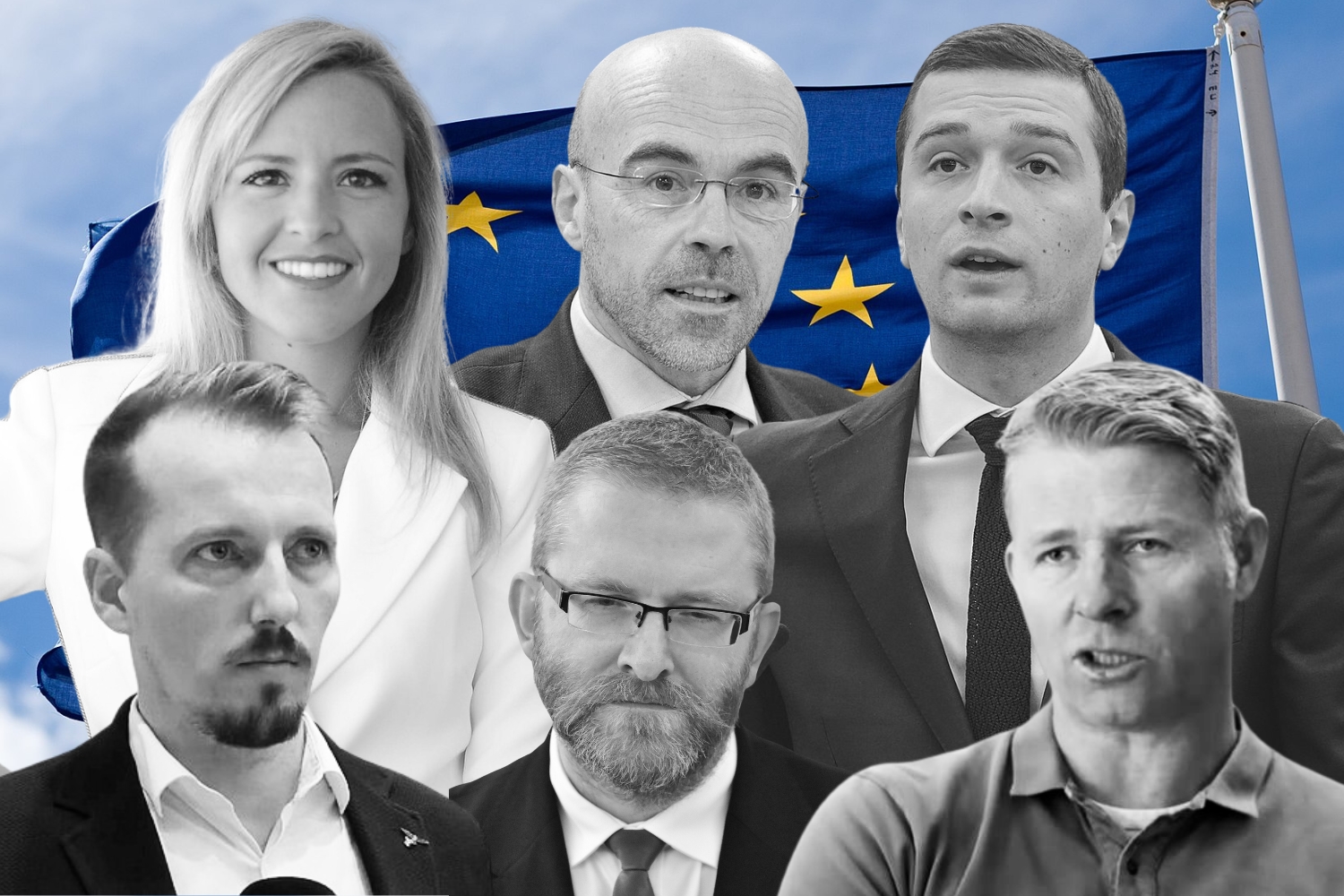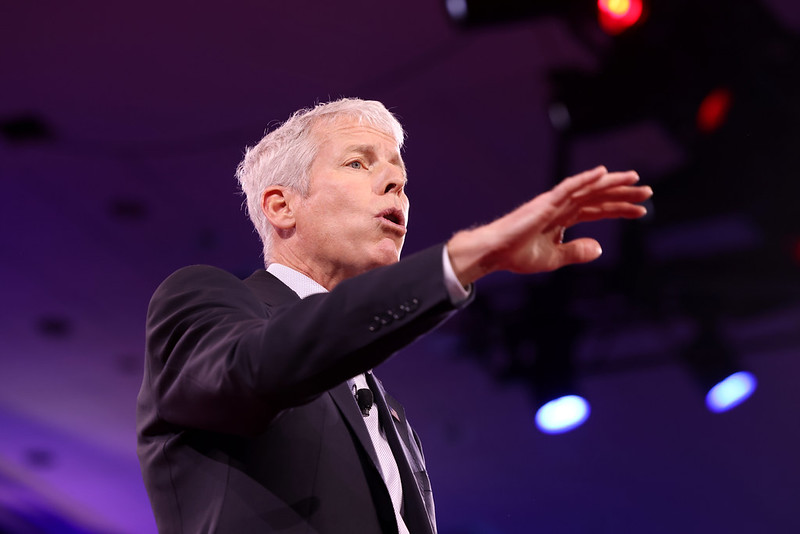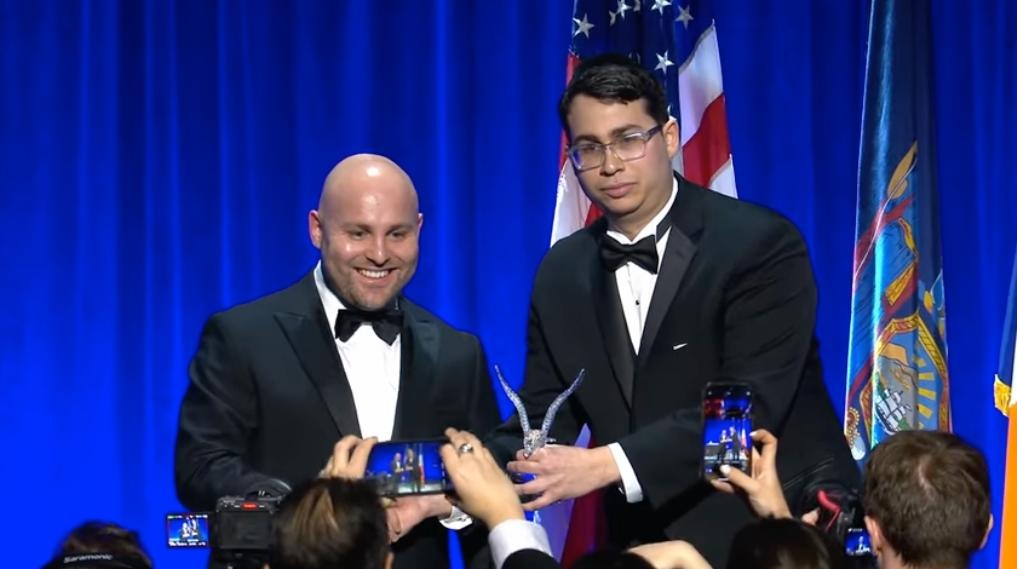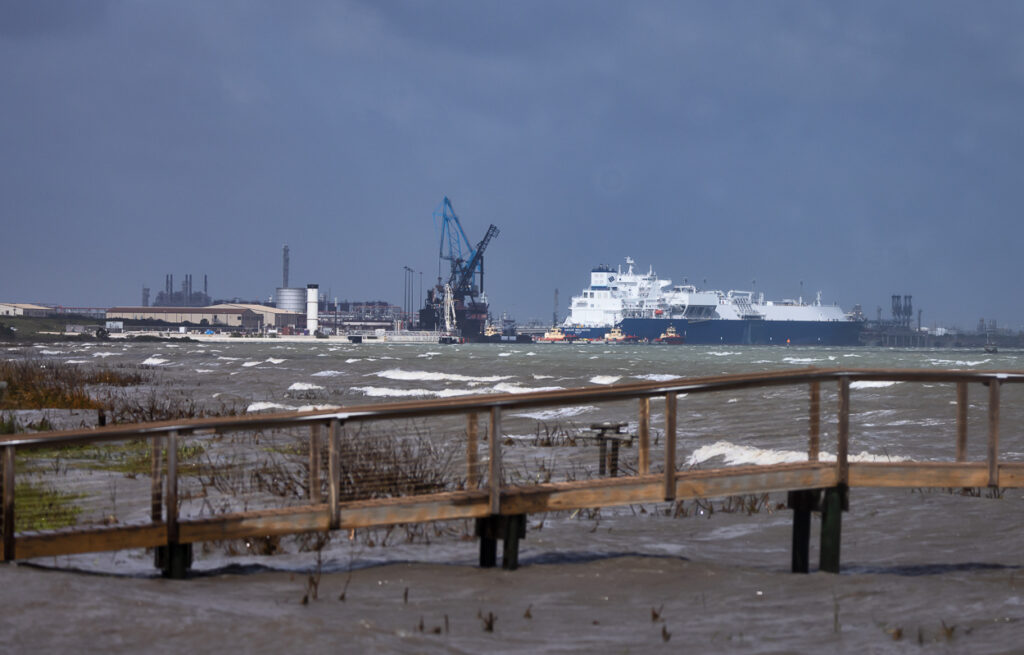Politicians have used their significant online platforms to spread misinformation on food and farming ahead of the EU elections, a new analysis shows.
Up to 375 million voters from 27 countries are casting their votes this week (June 6-9) to elect 720 MEPs to represent them in the European Parliament.
The election has been overshadowed by the resurgence of the far-right, who are expected to make major gains — with potentially devastating consequences for the climate.
DeSmog identified six MEP candidates who regularly used false narratives on food, farming and climate to win over voters.
From Germany and the Netherlands to Italy, France, Spain and Poland, high-profile right-wing and far-right politicians were aided by their strong online presence.
They posted misleading narratives to tens of thousands followers on YouTube, Instagram, TikTok, X and Facebook, as well as spreading false claims at in-person events.
Some cast doubt on the reality of climate science, while others painted EU regulators as part of an authoritarian “sect” wishing to control citizens through green measures.
MEP candidates, and their parties, also regularly took aim at the EU’s Green Deal. The sweeping package of measures is aimed at lowering agricultural emissions – that make up 10 percent of the bloc’s overall greenhouse gases – and protecting the healthy soils and ecosystems on which farming relies.
This legislation has already been significantly weakened. A wave of farmers protests in Europe earlier this year were jumped on by populist politicians, resulting in the watering down of measures including a law to restore nature – ignoring that many of the farmers’ concerns were unrelated to green rules.
Spain – Jorge Buxadé
Party: VOX
Likelihood of election: Very high
Jorge Buxadé leads the European delegation of VOX, a far-right Spanish party founded in 2013, and has served as an MEP since 2019. Buxadé is one of the better-known politicians in the party and regularly appears on TV and other media.
With close to 160,000 followers on X (formerly Twitter), over 86,000 followers on Instagram and 79,000 on TikTok, he often posts videos and comments on climate and farming issues, portraying the Agenda 2030, a set of UN sustainability goals, and the Green Deal as the common enemies of farmers.
During a campaign event for the European elections in Valladolid he said: “We cannot have a Common Agricultural Policy ideologically conditioned by fanatics and eco-radicals lobbies”.
In another electoral meeting in Albacete in May, he said, referring to a low emissions zone that had been announced in the city: “What Albacete needs is a lot of emissions, a lot of industry, a lot of cattle, a lot of farming because that’s what creates stable jobs.”
Buxadé often refers to climate change as an “ideology” and describes environmental groups and left-wing politicians as the “ecology sect”. He has also referred to the Green Deal as a “massive plan of layoffs for our farmers”.
“We need to change the concept of climate change. It is an ideological divisive concept, and [we need to] recover the old concept of environmental protection based on science, on common sense, and on economic growth,” he said in a meeting with MEPs held in Madrid in 2023.
Buxadé has a long history with far-right parties in Spain. In 1995, he ran as a candidate for the European Parliament with Falange Española de las JONS, though he failed to win a seat. In 1996 he ran as a candidate in Spain’s general elections with Falange Auténtica. Both parties are considered to be continuations of Falange Española Tradicionalista (FET-JONS), the extreme nationalist party that formed the political pillar of the Franco regime.
Italy – Silvia Sardone
Party: Lega
Likelihood of election: High
Silvia Sardone is a prominent figure in the right-wing populist party Lega. She began her political career in 2016 with Silvio Berlusconi’s Forza Italia.
Sardone serves as the coordinator of the Identity and Democracy group on the European Parliament’s Environment, Public Health, and Food Safety Committee. Elected to the parliament in 2019, Sardone is running again in the 2024 elections as the top candidate for the Northwest constituency, which includes the regions of Valle d’Aosta, Piedmont, Liguria, and Lombardy, covering around 16 million people.
Sardone has strongly downplayed the impacts of climate change during the 2024 European election campaign, according to analysis by DeSmog, as well as spreading other false narratives.
In an Instagram post in May, she accused the EU of “pretending to protect the environment” to “bind us hand and foot to the Chinese”. One of her frequent slogans, “green follies”, targets EU climate regulations. Sardone has also used her campaign to oppose edible insects and alternative proteins like lab-grown meat, and recently organised a rally titled “made in Italy vs insects”. She also claimed last month that the EU wants to “impose a food lifestyle” on us.
Announcing the rally, Sardone explained that her goal was to “highlight the troubling direction Europe has taken in recent years, criminalizing numerous traditional foods like meat, wine, and agricultural products. These are accused of being harmful to the climate or unhealthy. Meanwhile, the EU has funded studies on synthetic meat and approved various insects for food consumption”.
During a European Parliament session in April, she told “esteemed colleagues” that their “eco-fantasies are funding Europe’s decline”.
“The Green Deal and your absurd ecological transition laws are forcing us to stop investing in what makes us self-sufficient.”
With 147,000 followers on TikTok, over 155,000 on Instagram, and more than 1.2 million on Facebook, Sardone is one of Lega’s most influential voices. She was featured in a Politico article on politicians most adept at engaging Gen Z on TikTok, where Identity and Democracy is the most active and most followed parliamentary group.
An analysis by DeRev for the Italian edition of the Huffington Post highlights Sardone’s effective communication strategy, tailored to each social media platform. She often pits herself against her opponents and employs Islamophobic, nationalist, and anti-EU rhetoric.
In a TikTok video in October 2023, she claimed that Muslims “hate us in the name of Allah”. On Instagram, she suggested an “alliance between Islamic extremists” and far-left groups, and on Facebook that “we must defend our values in the face of growing Islamisation, which is a danger!”. She frequently attacks the Romani community and criticises EU policies, especially those on climate and agri-food sectors, which she argues harm the “made in Italy” brand and have “only negative consequences”.
Over the past year, the League party has built much of its political communication on attacking the EU’s efforts to find sustainable and alternative protein sources to meat. The primary targets of these attacks have been edible insects and lab-grown meat.
Poland – Grzegorz Braun
Party: Confederation
Likelihood of election: Unknown
Grzegorz Braun, arguably Poland’s most polarising and controversial politician, is running in this month’s elections as a representative of the hard-right Confederation party, a coalition comprising nationalist and ultra-conservative groups.
Braun spearheads the Confederation of the Polish Crown, widely considered to be the most pro-Russian faction.
The lawmaker faced widespread condemnation after blasting a Jewish menorah with a fire extinguisher in parliament last December. He’s also known for spreading misinformation about COVID-19 vaccines and propagating anti-Ukrainian rhetoric off and online.
Brown appears to have ramped up his incendiary rhetoric ahead of the EU elections. “If a gang of eco-terrorists can enter the farmer’s yard and arrest the animals because the owner did not connect Netflix to the barn, that’s the end of the world.” The comments were reportedly made during a 28 May debate for EU parliament candidates, organised by farmers at Agricultural University in Krakow, southern Poland.
“The very fact that this sinister organization, the European Commission, led by Reichsführerin [leader of a the Nazi paramilitary SS] von der Leyen, came to us with such pitchforks, like projects such as the Green Deal or the Building Directive, proves that it has the worst intentions towards us,” Braun reportedly added.
Braun, who has over 163,000 subscribers on YouTube, has also spread misinformation about the Green Deal. His recent video from a meeting in Sandomierz, south-eastern Poland, for example is titled: “The Green Deal is just the beginning! They want to pacify Poles.”
Braun and other Confederation politicians have backed the Polish farmer protests and called for the scrapping of the Green Deal, the party’s central campaign message.
Confederation currently holds no seats in the EU Parliament, but a recent poll suggests it will come in third this weekend, gaining 13 percent of the votes.
Netherlands – Sebastiaan Stöteler
Party: Partij voor de Vrijheid (PVV)
Likelihood of election: Very high
The Party for Freedom (PVV) is not currently represented in the European Parliament, but is predicted to gain nine seats. If it does so, it will become the largest Dutch faction in parliament.
In its 2024 manifesto, PVV says it plans to “overhaul” European climate and energy policies. It wants to move from “climate hysteria” to “climate realism” by prioritising farmers and fishermen over “smothering regulations”.
It aims to do this by prioritising building houses over executing policies aimed at solving the Dutch nitrogen crisis, it says, which has crippled many sectors of the Dutch economy. Ecologists have shown that rolling back existing policies to combat the crisis could be extremely damaging for nature in the Netherlands.
The PVV has also said it wants to make sure that the Dutch people don’t have to take European legislation into account when making decisions on eating meat, flying or choosing which fuel to use for their car.
The leader of the PVV in Europe is Sebastiaan Stöteler, who has been active in the party on a regional basis since 2018. He barely campaigns and seldomly answers requests for interviews. Despite his position in the party, the leader of the PVV in the Netherlands, Geert Wilders, appears on official posters for the EU campaign, rather than Stöteler. He was also apparently refused permission from Wilders to join a debate in May at which all the other major parties attended.
Due to his relative absence from the public sphere, Stöteler’s personal views remain fairly unknown.
In 2022, he posted on social media platform X that nitrogen policies are “leftist madness”. In that same year, in an introduction for a local branch of the PVV, he wrote that it’s important to “cherish” our environment, before going on saying that that is something different from all the “weird leftist climate rules that fill up whole meadows with solar panels and make large pieces of land uninhabitable through the installation of extremely large wind turbines”.
Earlier this party voted to suspend the building of high wind turbines recently in a regional government body.
In 2019 he reacted to an X post that played down the human role in climate change, saying “The next climate summit is in New York City. I would suggest: block that event’, before going on saying that Greta Thunberg has an “asperger-like disorder”, was being “abused” and “is allowed to perform her climate activist trick everywhere”.
France – Jordan Bardella
Party: Rassemblement National
Likelihood of election: High
28-year-old Jordan Bardella is the youthful face of the French far-right party, the Rassemblement National (RN), which is expected to gain 33 percent of the country’s votes in this weekend’s elections.
Bardella’s campaign has jumped on the back of farmers’ protests – channelling the furore around them – as a major talking point. The party’s discussion of farming – as opposed to immigration – is also in line with wider, ongoing efforts to detoxify its image.
The RN’s rhetoric on farming has been less extreme than that of far-right parties in countries such as Italy. French politicians have made fewer references to well-known conspiracy theories such as insect-eating than their Italian counterparts, for example.
However, Bardella and the Rassemblement National’s rhetoric on food and farming have still featured a number of misleading claims over the campaign period – including regular attacks on the EU’s Green Deal.
This fits into the RN’s broader euro-sceptic policy platform and desire to break free from Europe’s perceived control on French domestic policy.
In some of his attacks, launched in posts on X (formerly Twitter) Bardella has referred to the EU’s Green Deal as a “degrowth strategy”. He has also blamed the policy for single-handedly bringing farmers onto the streets in France earlier this year, and for farmers’ economic struggles.
These attacks ignore evidence that transforming agriculture is crucial for preserving a stable climate and biodiversity, as well as proof that the deterioration of the climate and nature is already leading to significant agricultural losses which also impact farmers’ profits in the EU and globally.
Bardella’s claims also ignore the fact that protests have been sparked by a wide variety of reasons – many of which do not include green measures as their root cause.
Claims made by Bardella that the EU has authorised the sales of products such as hormone-fed beef and chlorinated chicken “in the name of free trade” were challenged by a French interviewer in February.
An analysis based on data compiled by the website JeVoteLobby found that despite presenting itself as defending the interests of French workers over those of commercial interests, Rassemblement National MEPs often in fact tended to promote industry interests when voting in the EU parliament.
The party has in recent years backed the wide-scale use of pesticides, aligning itself with France’s large industrially-aligned farmers’ union, la Fédération Nationale des Syndicats d’Exploitants Agricoles (FNSEA).
All the candidates and parties referenced in this article were contacted for comment. None had responded prior to publication.
Anthony Lee – Germany
Party: Freie Wähler
Likelihood of election: Low
Anthony Lee is a farmer, influencer, and MEP candidate with the German conservative populist party Freie Wähler (Free Voters). He is the spokesperson for Landwirtschaft verbindet Deutschland (LsV), a populist farming group involved in organising protests against the EU’s Green Deal and other concerns, including trade deals and alleged land grabs, on 4 June.
Lee, who has over 100,000 Youtube followers, became a familiar online presence during farming demonstrations in Germany at the start of this year, after he was interviewed by right-wing political pundits, including the Canadian pundit Jordan Peterson.
Lee is an outspoken opponent of climate regulations for the food and farming sector, especially any plans to reduce the number of livestock. He uses classical misinformation tactics. Some of the facts might be true but the conclusion is false. In a Youtube video from May 2024, he cites a study by the University of Yale which found that a herd of 170 bison could help store CO2 equivalent of 43,000 cars. Lee says: “This is fantastic news […]. Climate change is over” and that “grazing must be promoted in Europe in order to stop climate change.”
He has also downplayed the impacts of climate change. In an Instagram video from July 2023, he claimed: “Climate catastrophe. I can’t hear about it anymore. […]. Here nothing is happening regarding the climate catastrophe. In agriculture, everything is well.”
In a Facebook video from early May, Lee denied that agriculture was contributing to insect decline or water pollution in Germany, claiming, “They want to abolish agriculture, to limit it as much as possible.” A 2017 study found that insect biomass decreased by 75 percent in nature protection areas across Germany, partly due to increased agricultural intensification. There is a nitrate surplus in groundwater in every sixth monitoring station in Germany, government data shows. The main culprit: Pesticides and manure runoffs.
Lee has spread misinformation about organic farming. In a video titled “are we really this dangerously stupid” he shows his maize field and compares it to his neighbours’ organic barley field, which is full of weeds. He claims that his organic farmer neighbour will only harvest half of what he will harvest. He said: “If we have the dream to be 100% organic, which our green government has planned, then please explain where our food will come from. Especially for the poor. This is why every third child dies from hunger.”
According to a study, organic farmers harvest on average 15 percent less than their conventional colleagues. The world produces enough food to feed everyone on the planet. The reasons for world hunger are access and availability, both of which are disrupted by things like extreme weather, food waste, or conflict – but not organic farming.
In January, during an interview with far-right commentator Eva Vlaardingerbroek shared on her social media accounts, Lee stated, “They want our land. […] They want our land to build industry, houses, I don’t know, for refugees, whoever, I don’t care for what.”
The claim appeared to refer to a conspiracy theory that first emerged in the Netherlands in 2019, stating that the government was using non-existent climate change as an excuse to buy out cattle farms for housing refugees. Lee told Politico that he had said there were “many reasons” for land being taken.
In a TV interview in February, Lee denied he was radical right-wing, saying: “I try to make it clear how dramatic the situation is. If you just tell facts, no one listens”. He pulled out of speaking at an event for the far-right German group AfD last year after facing widespread criticism, but told Politico in May that he had not ruled out working with the group.
All the candidates and parties referenced in this article were contacted for comment. None had responded prior to publication.
Subscribe to our newsletter
Stay up to date with DeSmog news and alerts






